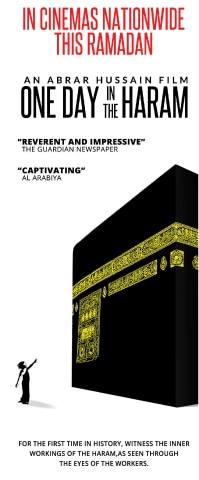
Like others before him, Sajid Ahmed, a native Bangladeshi, came to Saudi Arabia in search of a better future. The job he ultimately landed left him speechless.
Ahmed works in the janitorial department of Al-Masjid Al-Haram. He’s been at this job for the nearly 16 years. It’s not in everyone’s kismet to work here, he tells the documentary crew filming him a few feet away from the Ka’aba — the holy centre and direction of supplication for the Muslim world.
The janitorial department is made up of Pakistanis, Indians, Sri Lankans and Bangladeshis, amongst natives from other countries. It is, by far, the department with the longest working hours, tasked with keeping the Great Mosque of Mecca spotless. Its staff works in unison without discrimination or squabbles, he tells the camera. Just a few minutes before Ahmed’s very brief interview, the documentary crew filmed the janitorial department at work.
A team of 10 men, armed with mops and wipers stood in a cascading line, waiting for the signal to start sweeping. Chugging behind them are at least five floor-sweeping machines, ready to follow suit. Then, in a flash, they rush forward, sweeping the white tiled floor with military precision (in the narrator’s own words). Their formation, hardly disuniting.
British-Pakistani filmmaker Abrar Hussain’s One Day in the Haram goes behind the scenes at the Great Mosque of Mecca
Shot in slow-motion from low, high and constantly moving camera angles and stitched together in the edit with zealous precision, the scene has the uncanny resemblance of an action film. It’s not the first time we see cinematic flair in the middle of a very to-the-point, minimalistic documentary about the inner workings of the Great Mosque.
However, don’t think of One Day in the Haram as just another documentary showcasing the extravagant building of the holy site. The film has a very different angle: it looks at a handful of departments that manage the Grand Mosque in the span of a single day.
Director Abrar Hussain, a British-Pakistani filmmaker, whose previous credits include humanitarian documentaries and religious programmes for UK’s Islam Channel, frames this film’s narrative between the five prayers. Starting from Fajr and ending a little after Isha, Hussain follows Bandar al-Hitlab — the head of the Grand Mosque’s recently set up social media department. Early in the day, the social media department — launched hardly three years back — strategises on how to spread a positive message of Islam to the world. One Day in the Haram, then, turns out to be a great opportunity, one assumes.
Filmed in 18 months (the actual shooting at the site was completed in a month; the rest were for permits, clearances and pre-production), the documentary covers al-Hitlab as he moves from department to department, introducing the audience to aspects they — and many pilgrims visiting the mosque — may not know.
We see the making of the Kiswa, the black cloth covering the Ka’aba, at a dedicated factory where digital machines design and weave the cloth, while expert tailors embroider Quranic verses by hand. It is a fine art and, like all arts, making the Kiswa is an expensive project. The gold thread used to embroider the verses is imported from Germany; it once came from Egypt, we’re told.
We then see the distribution of the Zam Zam holy water. A roving team of water distributors don backpacks and walk amongst pilgrims. Al-Hitlab, eager to try out the process himself, wears a backpack and is immediately swarmed.
Although it is high on each department’s priority list to be inconspicuous, there are a few moments in the documentary (such as the scene mentioned above) that feel a touch orchestrated; however, they come and go in a flash, as if the director is aware of them.
With the prayers used as chapter breaks — the title of the prayer is flashed in big, bold letters on the screen — we see the IT, maintenance, azaan (call to prayer), broadcast and religious affairs department at work. Each department works independently, yet is integrated seamlessly into a very calm, corporate structure. Their clockwork precision and sync is impressive.
As a filmmaker, Hussain keeps an impartial distance in his narrative, keeping his lens away from matters of conflicts. At the right moment, Hussain also uses the film as a primer on Islam, and at those moments, we realise that the documentary is not only intended to be a tour of the unseen workings at the mosque; it is a deliberately-produced showcase for non-Muslims of the world.
Nevertheless, One Day in the Haram, brilliantly shot from locations inside the Grand Mosque with hardly a 90-minute running time, is a minimal, engaging documentary that doesn’t have hard questions to ask. And sometimes, given the subject matter, that may not be a bad thing.
The documentary is running in cinemas throughout the month of Ramazan
Published in Dawn, ICON, May 19th, 2019













































